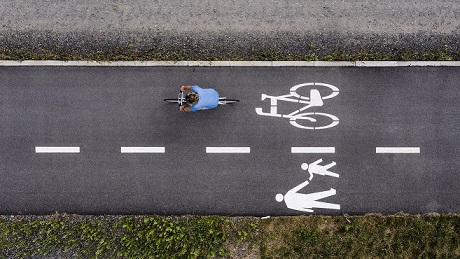An EU-funded project has taken steps to reduce pollution, particularly carbon emissions, from transport in the north of the Opolskie region in south-western Poland. Implemented in the counties of Kluczbork, Olesno and Namysłów, the project has modernised infrastructure to provide clean, safe and efficient public transport, and paths for cyclists and pedestrians. It is estimated that the improvements will lower greenhouse gas emissions by the equivalent of almost 70 tonnes of CO2 a year.
- 15 April 2022
'The number of cars that will use the park and ride facilities is estimated at over 44 000. This will reduce greenhouse gas emissions and ensure access to safe bus stops.'
Fifteen low-emission buses with overall capacity for more than 1 200 passengers have been acquired for use in municipal public transport. The project assumes the construction of 75 km of bicycle paths. Currently over 65 km of bicycle paths have been built and 1.25 km of existing cycle paths have been renovated.
Five transport hubs have been created to better integrate various modes of transport, and 10 park-and-ride and 16 bike-and-ride services have been set up. Parking facilities linked to these services have spaces for 225 vehicles and 164 bikes.
More reliable services
Along with the upgrades to transport infrastructure, a modern, dynamic and interactive traffic information and management system has been installed to support the running of the new buses. Passengers receive precise details of planned bus journeys, while dispatchers and operators can see the punctuality of the services by tracking the location of individual vehicles in real-time.
The system has contributed to increasing the reliability of public transport, which has enhanced the image of the service among local people. Moreover, the project has built access routes to make it easier for passengers to get to bus stops and improved safety around the stops. Further elements of the upgrades include the installation of LED lighting and rainwater drainage systems along cycle paths.
Better quality of life
In addition to the public administrations of the three counties participating in the project, the work involves the authorities of 11 municipalities within those counties: in Kluczbork County, the municipalities of Byczyna, Kluczbork, Lasowice Wielkie and Wołczyn; in Olesno County, the municipalities of Dobrodzień, Olesno, Praszka, Rudniki and Zębowice; and in Namysłów County, the municipalities of Namysłów and Pokój.
The actions carried out under the project should encourage residents of all of these areas to use public and non-motorised transport rather than cars, where possible. This will reduce volumes of motorised traffic in the centres of urban areas in the three counties, thereby reducing exhaust fumes, dust and noise generated by vehicles. As a result, local communities will benefit from cleaner air and a better quality of life.
Total investment and EU funding
Total investment for the project “Implementation of low-carbon strategies in the northern subregion of the Opolskie Voivodship” is EUR 14 012 657, with the EU’s European Regional Development Fund contributing EUR 11 910 759 through the “Opolskie Voivodeship” Operational Programme for the 2014-2020 programming period. The investment falls under the priority “Low-carbon economy”.

